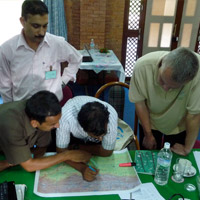
Total Awarded: $18.6 Million
Total Grants: 48
Duration: 2002 - 2009
Background
The MacArthur Special Funding Initiative sought to contribute to the evolution of an intellectual property system that provides incentives for creating scientific and cultural materials, protecting copyright owners who bring these materials to consumers, and enabling users to take advantage of the opportunities presented by digital technologies to create and share content, especially for educational, scientific, and artistic purposes. The core of this initiative was to contribute to the design of institutions that govern how rights to data and information will be constructed in the online environment, and help improve the laws that define the scope and reach of those rights.
This area of work began in 2002 and was originally intended to end after five years; however, the Foundation extended the original timeline by an additional two years. The purpose of the evaluation was to examine the extent to which the grantmaking initiative had adhered to and fulfilled its stated goals.
What We Evaluated
The evaluation’s purpose was to better understand the Foundation’s role in this emerging field, to evaluate the Foundation’s grantmaking, and to examine the aggregate results of grantees’ projects. Dr. Ruth Okediji, William L. Prosser Professional of Law, University of Minnesota Law School, was selected to do this work. She reviewed over 12,000 pages of reports submitted by grantees, interviewed grantees and non-grantees, including leaders in the field, and conducted independent research, including analyses of case law and policy discussions.
What We Learned
As stated by the evaluator,
"On close examination…the initiative was not merely about intellectual property rights, but instead about fundamental principles grounded in the explicit language and goal of the U.S. Constitution that the public welfare could and should be explicitly attended to in the design of laws that define the rights and interests of consumers and creators.
Key findings demonstrate that the initiative:
- Was timely, necessary, and helpful in restoring balance to the public debate about the nature, scope and role of intellectual property rights.
- Supported policy analysis, participation in international debate, and demonstration projects, linking and coordinating efforts across disciplines and scholarly research.
- Motivated new research questions in economics, political science, law, and computer science, generating a robust set of literature and empirical data.
- Spurred a “field” dedicated to the cross-disciplinary analysis of the interaction between innovation and society at large.
- Did not undermine intellectual property rights or support any unauthorized distribution of content online. Rather, grantees worked to give the public alternatives to “hacker” culture. Moreover, the work of several grantees informed significant policy shifts domestically and internationally, for example, licensing as well as patent and copyright reform.
- Impacted global education, particularly in the developing and least developed countries, including a serious effort to educate the most impoverished communities around the world about the role of intellectual property policies in advancing human development.
More Information
View the executive summary ›
View MacArthur's evaluation philosophy ›


